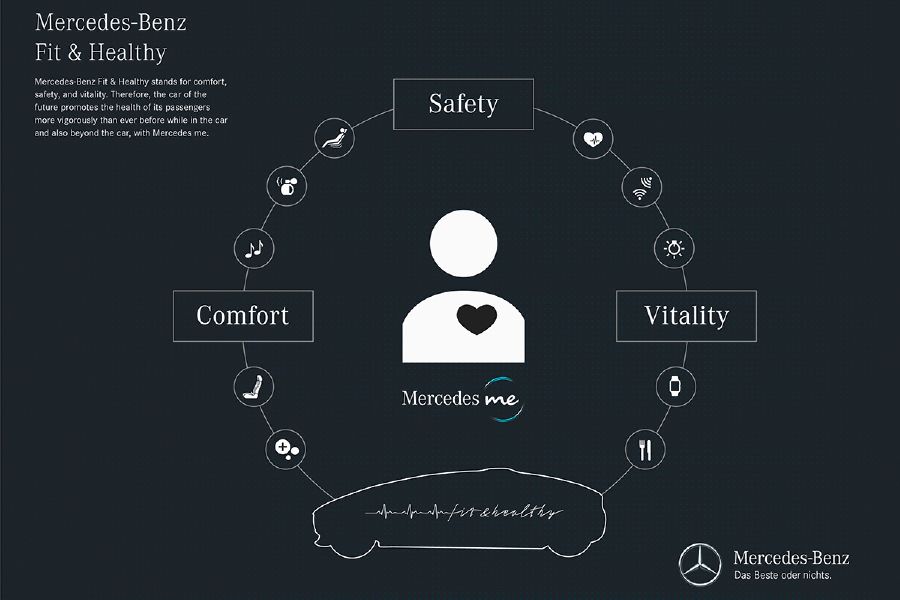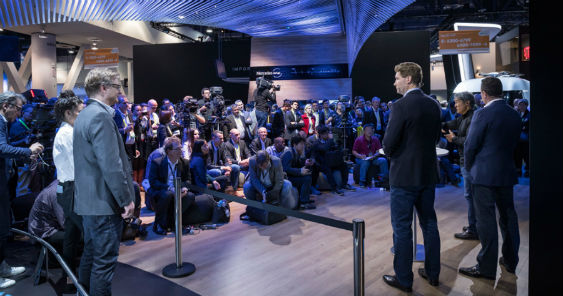by Shepherd Laughlin, J. Walter Thompson Intelligence
LAS VEGAS – Only a few years ago, wearable health trackers were a buzzworthy novelty at CES, and before long you could hardly turn a corner on the show floor without tripping over a treadmill demonstration. More recently, with the looming prospect of autonomous driving, the prevalence of auto brands at CES has led some to jokingly dub it the “Car Excitement Show.”
In 2017, the two trends are meeting, as auto brands are floating concepts that link cars with health. Hyundai has partnered with human-centric design firm IDEO on a multisensory vision for mood enhancement behind the wheel. Meanwhile, Mercedes-Benz has organized its showing this year under the banner of “Fit&Healthy”, including “a vision of how society’s increasing health consciousness can be intelligently combined with future mobility.”
The Hyundai concept focuses on elevating a driver’s mood in different contexts. “We took a very quick point of view about how health is actually mental health in this case–mindset and emotional wellness,” said Andrew Evans, principal product designer at IDEO. “The concept is really about mood shift–shifting a driver’s emotional state as the car perceives that there might be a need for that.”
If a driver starts to nod off at the wheel, the car will sense this and send an “alert” burst of cool air, a refreshing scent and brighter lights. Conversely, if a driver is stressed or experiencing a bout of road rage, the dashboard gets warmer and sends out a calming fragrance.
Similarly, the Mercedes-Benz concept allows cars to adjust temperature, lighting, sound and scent in response to drivers’ physical health. Steering wheels would contain sensors that measure heart rate, and seats could respond to changes by adjusting to improve blood flow. Ola Källenius, a member of the Daimler Board of Management responsible for group research and Mercedes-Benz cars development, has said that the features could be launched along with the brand’s next A-Class model.

Mercedes-Benz also introduced a concept to help prevent health mishaps for commercial drivers. The “Predictive Emergency Defense” system uses monitors to keep tabs on drivers’ cardiovascular health, and intervene in case of an emergency. “If this PED system detects irregularities, the vehicle will ask if you are OK,” Källenius told trade magazine CCJ. “If you don’t react, it will place an emergency call for medical assistance and stop the vehicle.”
Hyundai designers emphasize that their concept is passive and doesn’t require drivers to use any additional equipment. “We have a pretty strong point of view that any sensor interaction, anything that’s reading your data, should be integrated into the existing car context,” said Evans. “Without any effort, the car is able to get a pretty accurate sense of your mental state and what your needs might be.”
While the Hyundai concept was conceived for today’s cars with their human drivers, the possibilities expand with autonomous vehicles. “You can turn that dial up to 11 when everything’s autonomous,” said Evans. “Suddenly, calm bursts aren’t about calming you down with road rage, but about putting you to sleep.”

While these solutions haven’t yet come to market, they suggest new ways that environments could be adapted to promote people’s health and wellbeing, whether at they’re at home, on the road, or staying in a hotel.










